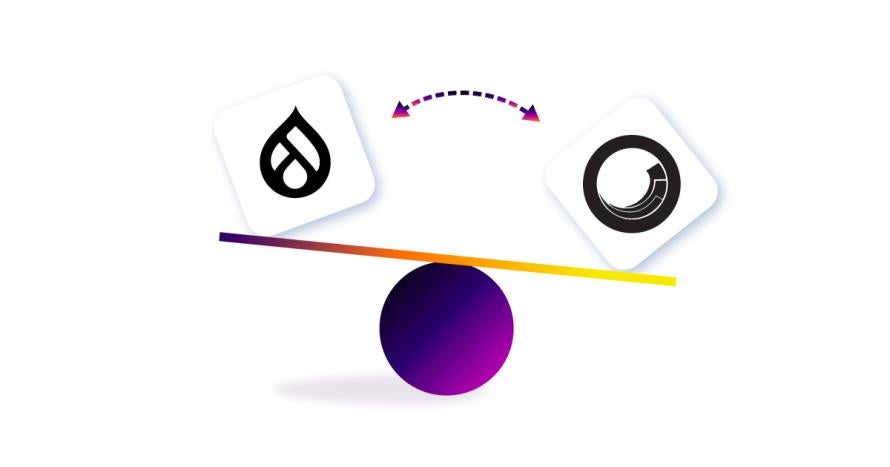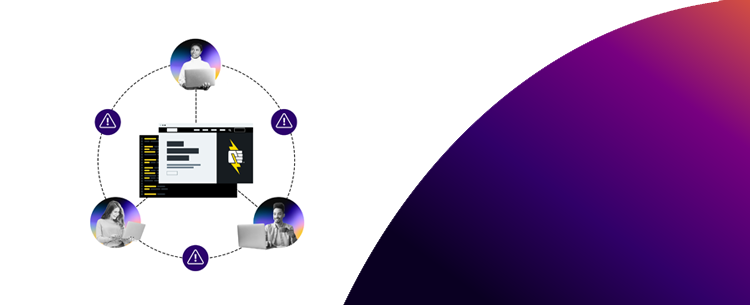Making an Informed CMS Choice: Drupal vs. Sitecore
So, you’re stuck between Drupal and Sitecore for your content management system (CMS)? That’s more than understandable. Both are extremely successful platforms, but the key is understanding who they are made for.
Image

We’ll start by mentioning that Drupal is the more popular choice, powering 8.3% of the top 10,000 websites that use a CMS, compared to just 0.5% for Sitecore.
This is mostly due to Drupal’s versatility and open-source nature, with endless customization options and a vast community of users and developers. If you value freedom, flexibility and support, Drupal is your champion. Its modular architecture and extensive library of modules make it a dream for ambitious site builders and content creators alike.
On the other hand, Sitecore is an enterprise-focused, closed-source CMS renowned for its advanced digital marketing tools. Just bear in mind that its closed-source nature means you’ll be leasing the software, so you won’t fully own your content in the way an open-source platform allows. To be honest, this is a big red flag for us. Your website is so valuable to your business – surely you want to be as fully in control as possible, right?
In this guide, we’ll look at the core differences between these two platforms, to help you decide which CMS best suits your business needs.
Drupal vs. Sitecore: Examining the Core Functionalities and Features
Focusing on content management, performance, customization and security, let’s compare how Drupal and Sitecore match up.
Understanding Content Management on Both CMSs
Drupal's open-source structure and modular architecture give its users creative freedom. With core modules like Content Moderation, you can ensure all content goes through a business’s approval process before publication.
Drupal also embraces the Create Once Publish Everywhere (COPE) philosophy, making it an excellent platform for publishing content across multiple channels. The COPE concept is especially useful for large businesses that create content beyond a website, pushing it out to apps and kiosks. Through Drupal, content can easily be repurposed without having to start from scratch every time.
While Sitecore has improved its content management tools with features like personalization, A/B testing and marketing automation, Drupal offers more out-of-the-box functionality. This includes flexible custom content types, built-in multilingual support and advanced taxonomy systems. Such features can be further customized in line with business needs, giving users the ultimate control over their websites.
Breaking Down Performance and Scalability
Drupal's architectural design is built for fast performance and future potential. Its caching capabilities allow for swift content delivery, even under heavy loads. Many large organizations, such as the Grammy Awards and Doctors Without Borders, rely on Drupal.
To take your site to the next level, Pantheon can enhance Drupal's performance even further through its scalability. Our high uptime guarantee and fast loading speeds are tailored to the needs of high-traffic websites. And we’re proud to be the world’s fastest host for Drupal websites!
Similarly, Sitecore excels in managing large traffic volumes and spikes, making it suitable for enterprises with significant customer bases. However, users of Sitecore still need to devote more effort than they may like to understand scalability options. Generally, open-source systems put the burden of performance and scale on their users. However, with a platform like Pantheon, Drupal teams can treat scalability as a solved problem.
Customization and Integration Capabilities of Drupal and Sitecore
Drupal’s open-source nature offers extensive customization and integration opportunities, making it the choice of many who want a bespoke site.
Modular architecture allows easy integration with many third-party apps like Salesforce, Mailchimp and Google Analytics. This flexibility gives a significant advantage to those looking to create a highly customized digital experience.
In contrast, Sitecore is a closed-source CMS, which limits its customization capabilities. While Sitecore provides modules for customization, these are often more time-consuming and less flexible when compared to Drupal.
Sitecore excels in integrating with apps like Salesforce, but for broader integrations, businesses need to use a developer.
A Closer Look at Security
Built on .NET architecture, Sitecore inherits the high-security norms of the Microsoft ecosystem, ensuring automatic updates and patches for advanced protection. Furthermore, its limited integration capabilities with external systems – while not great for flexibility – do reduce the risk of third-party security threats.
Drupal is well-known for its security measures. With a specialized team and vast community of contributors to its open-source platform, security is constantly refined and improved.
The platform's security team and Drupal Steward Program ensure that vulnerabilities are identified and addressed promptly. Security vulnerabilities are also disclosed and addressed by the community, allowing companies to stay ahead of potential threats.
Image

Using Pantheon to host your Drupal site adds further layers of security thanks to our:
- Advanced Global Content Delivery Network (AGCDN): Pantheon’s CDN mitigates traffic spikes and optimizes performance. This protects against Distributed Denial of Service (DDoS) attacks by distributing traffic across a global network of servers to prevent overload.
- Web Application Firewall (WAF): The WAF inspects each request, preventing common attacks like Structured Query Language (SQL) injection, while the CDN mitigates traffic spikes and optimizes performance.
- Autopilot: This feature automatically detects, tests and deploys updates for Drupal sites. It uses visual regression testing (VRT) to ensure updates do not break the site. Site owners are alerted if any issues are detected from an update, allowing you to fix them before deployment.
- Multizone Failover: If an origin data center fails, Pantheon reroutes your traffic to another zone, keeping your business online.
Accessibility of Drupal vs. Sitecore Websites
Drupal provides several accessibility tools out of the box. It offers default support for the Web Accessibility Initiative – Accessible Rich Internet Applications (WAI-ARIA), ensuring stringent accessibility compliance.
In contrast, while Sitecore sites can meet World Wide Web Consortium (W3C) accessibility standards, achieving this often requires significant time and customization.
A Deep Dive Into the Pros and Cons of Drupal and Sitecore
We’ve just covered Sitecore and Drupal’s core differences in functionality and features. Let's delve deeper into other factors that will impact a business’s decision to use one over the other:
Cost
Drupal is an open-source platform, meaning the software itself is free. Of course, there are additional costs such as buying the domain and hosting but upfront costs will almost certainly be lower. In contrast, Sitecore includes hosting within its licensing fee, although costs increase depending on the features and support you need.
Vendor Dependency
Drupal's open-source nature makes it vendor-agnostic. Users own their software and are free to modify and extend it as needed. This independence allows for greater flexibility and control over your brand’s digital experience.
On the other hand, Sitecore is a closed-source platform, so users lease the software from the vendor. This dependency can limit the ability to view or modify the underlying code, restricting customization and innovation.
At Pantheon, we strongly believe that a website is far too great an asset for a business not to own fully. Using Drupal enables brands to innovate by easily integrating new features and designs, free from vendor limitations. This freedom to evolve in real time can give an enterprise a significant advantage in the marketplace. The benchmark for success is constantly changing and evolving; you want a CMS that allows you the freedom to continuously improve your site to stay competitive.
Community
Drupal boasts an incredibly strong community that works together to ensure a secure platform. The community is highly supportive, offering excellent assistance in addressing any issues or challenges users may face. While Sitecore also has user forums and a professional community, it’s far smaller than Drupal's network.
The Role of Pantheon in Enhancing CMS Performance
Pantheon is a fast and secure WebOps platform designed to enhance the performance of websites built on Drupal and WordPress. Our platform offers a range of features for agile web development and management, ensuring that businesses can deliver an exceptional digital experience:
Serverless CMS
Pantheon’s Serverless CMS approach to infrastructure eliminates the need for server maintenance, allowing businesses to focus on innovation. Serverless architecture ensures scalability and reliability, making it a cost-effective solution for enterprises.
Multidev Environments
The platform enables developers to create separate environments for development, testing and live deployment. This allows teams to work on different branches simultaneously, ensuring that new features and bug fixes are thoroughly tested before going live.
Website Portfolio Management
Pantheon allows businesses to manage multiple websites from a single platform. This centralized management system makes it easier to deploy updates, monitor performance and maintain consistency across all sites.
Partner Agency Program
The Partner Agency Program connects businesses with expert agencies that specialize in Drupal and WordPress development. These partnerships ensure that businesses have access to top-tier development and support services.
Image

Make Your CMS Decision: Next Steps With Pantheon
When it comes to choosing a CMS, the decision ultimately comes down to what matters most to your business. Do you value creative freedom and access to a thriving community of developers? Or are you willing to sacrifice ownership and customization for advanced marketing features?
If you're ready to take your digital presence to the next level, Drupal is a clear winner. Its open-source nature makes it the choice of many ambitious site builders. You can innovate to your heart’s content, free from vendor limitations.
And when you pair Drupal with Pantheon's unparalleled speed and ironclad security, you have a perfect match. Pantheon ensures that your website is fast, secure, and always up-to-date. And with our comprehensive migration support – including managed migrations – making the switch to Drupal has never been easier. Why settle for a closed-source CMS like Sitecore, where you’re just leasing the software and don’t truly own your website?
Enhance the quality of your CMS today by trying Pantheon for free, and enjoy the fastest Drupal hosting on the planet!